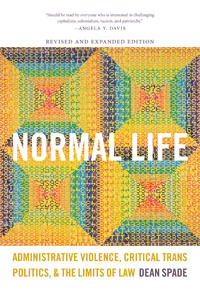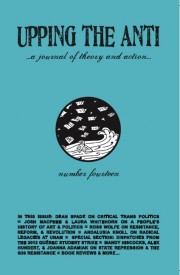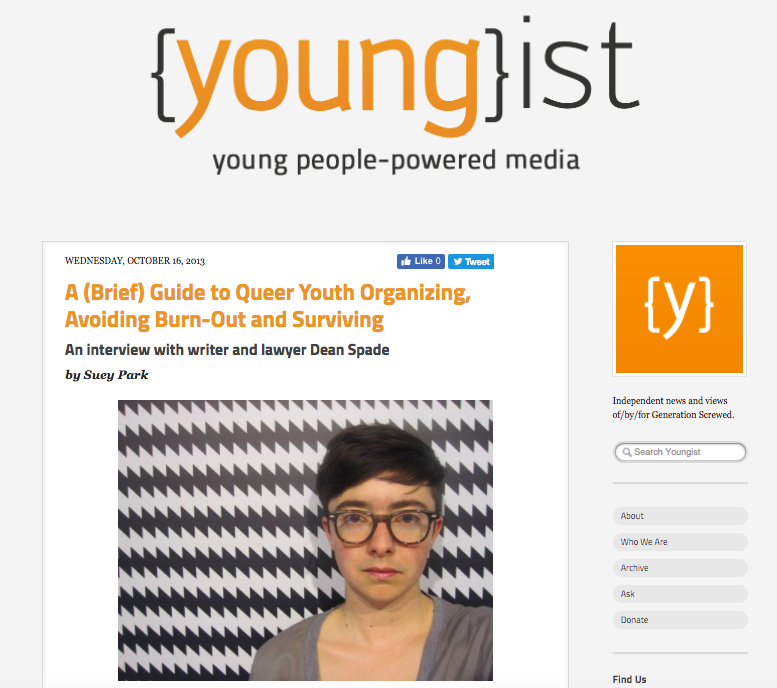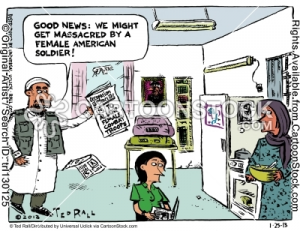Hope Dector and I just released six new videos from our Queer Dreams series. These all examine the limits of marriage inclusion as a liberation strategy for queers, and the reasons it became so central to the agendas of the most well-funded LGBT advocacy organizations. I hope these will be useful tools for teaching and community conversations.
New Writing and Videos
I have gotten a bit behind at posting new work. Many new things have come out.

First, the new edition of Normal Life: Administrative Violence, Critical Trans Politics and the Limits of Law is out from Duke University Press. It includes new reflecting on the mainstreaming of trans politics and new cover art by Xylor Jane.
Normal Life was published last month in Spanish from Bellaterra Press. You can find Una Vida Normal here.
In other translations news, I had a wonderful visit to the Center for the Study of Sexualities at the National Central University of Taiwan. My generous hosts translated some of my writing to Mandarin. Here is Chapter 2 of Normal Life, “What’s Wrong with Rights?” in Mandarin. Here is the article I co-authored with Morgan Bassichis and Alex Lee that appears in Captive Genders, “Building an Abolitionist Trans & Queer Movement with Everything We’ve Got” translated to Mandarin. And here is an article with some US trans law basics in Mandarin.
My documentary Pinkwashing Exposed: Seattle Fights Back! (1 hour long) came out in the summer of 2015. You can watch the entire film on the website and you can watch with captions in English, Spanish or Greek captions (Mandarin is coming soon!).
We also made short clips that address particular topics that are easy to share. These include “What is Pinkwashing?” “What is Brand Israel?” and “What is Normalization?” I put all of these and the full documentary online hoping that people will do free screenings in their own communities and on their campuses. I am happy to report that the documentary has already screened at festivals and community events around the United States and in Canada, Argentina, Japan, Korea, Greece, Holland and in the UK. It is playing on Cambridge Community Television tomorrow! You can read a review of the Pinkwashing Exposed in the recent issue of Make/Shift magazine.
Last month, The Scholar and the Feminist Online published a special issue co-edited by Soniya Munshi and Craig Willse, entitled “Navigating Neoliberalism in the Academy, Non-Profits and Beyond.” It is full of great articles and I highly recommend the whole issue. It includes a new article I co-wrote with Dr. Rori Rohlfs called “Legal Equality and the (After?)Math of Eugenics” that looks critically at the proliferation of new statistics about LGBT populations and how they are used in legal reform efforts. The special issue also includes six more short videos in the series that Hope Dector and I are making as part of our Queer Dreams and Nonprofit Blues project.
Finally, in November I participated in an Oxford Union Debate about whether states should recognize marriage. It was probably among the most uncomfortable events of my life, not only because I was wearing a tuxedo but also because I was on the “same side” of the debate with a raging zionist and a raging transphobe. Still not sure what to make of all that, but if you want to see what I said, here is the video.
A (Brief) Guide to Queer Youth Organizing, Avoiding Burn-Out, and Surviving: Interview by Suey Park
War and Marriage
 This week a new article by me and Craig Willse went up on Organizing Upgrade that aims to capture some of the important left critiques of marriage that have been obscured by the pro-marriage messages of same-sex marriage advocacy.
This week a new article by me and Craig Willse went up on Organizing Upgrade that aims to capture some of the important left critiques of marriage that have been obscured by the pro-marriage messages of same-sex marriage advocacy.
Also, this interview about why the new campaign for military inclusion for trans people won’t benefit our movements went up on BuzzFeed. As the President pushes us toward war in Syria, its especially important to build shared analysis about anti-war politics. Military service inclusion campaigns invite us to be the new poster children of a purportedly fair and equal military, meanwhile the brutal violence of US militarism continues around the globe. I am hoping both these pieces will stimulate conversation and be useful among activists and in classrooms.
Radio, Buzz and Stopping Jail from Being Built!
KPFA did some great programming around Pride this year focusing on critical queer and trans political resistance and critiques of same-sex marriage, gay military service and other hallmarks of wealthy white gay politics. Here is a whole day of programs that aired on Pride Sunday. Here is a show focusing on the critique of same-sex marriage advocacy, including Kenyon Farrow, Mattilda Bernstein Sycamore and me. In other news, Buzzfeed published a list of 24 Americans Who Changed the Way We Think About Transgender Rights. I’m excited to be on any list with Sylvia, Marsha, Miss Major, Lou and all these other amazing people.
Finally, I am so excited by all the inspiring work being done by Washington Incarceration Stops Here. We are doing an awesome postcard campaign about what people think our county really needs rather than a new youth jail and family court buildings. And we’re building a coalition of groups who have signed on to our Points of Unity. If your organization wants to sign on, no matter where you are, please let us know! We’re also starting a zine so please let us know if you have art or writing you’d like to contribute or if you can help spread the word to people who may want to contribute, especially youth and people impacted by criminalization and child welfare systems.
New article about pinkwashing and new interview in Upping the Anti
 Big thanks to Robert Nichols for interviewing me for the journal, Upping the Anti. You can read the interview here. Also, the N.Y.U. Review of Law and Social Change just published a symposium issue about the Perry v. Brown same-sex marriage litigation. I have an article in it about pinkwashing. I also recommend you check out articles by Andrea Ritchie, Gabriel Arkles, and many more.
Big thanks to Robert Nichols for interviewing me for the journal, Upping the Anti. You can read the interview here. Also, the N.Y.U. Review of Law and Social Change just published a symposium issue about the Perry v. Brown same-sex marriage litigation. I have an article in it about pinkwashing. I also recommend you check out articles by Andrea Ritchie, Gabriel Arkles, and many more.
Blog Post for Upcoming Conference
This coming Friday and Saturday I’m heading to Los Angeles for a conference that marks the 40th anniversary of Roe v. Wade and the 10th anniversary of Lawrence v. Texas. In advance of the conference, speakers were asked to write blog posts related to the themes of the conference panels we are participating in. These were posted to the Balkinization blog. I thought I’d re-post what I wrote here as well:
Sexual freedom, legal equality and settler colonialism
New Videos and a New Syllabus
I am teaching a January Term class at Seattle U for the first time, starting in a few weeks. It will be a four day intensive about imprisonment. I just posted the syllabus in case it is of interest.
I also wanted to share some new videos. GritTV recently posted an interview that Laura Flanders did with me.
http://blip.tv/grittv/dean-spade-the-most-imprisoning-nation-in-the-world-part-1-of-2-6482091
Also, I recently attended the World Social Forum: Free Palestine! in Porto Alegre, Brazil. I was part of a Queer Visions contingent that put on two public panels, this one and this one. Here’s the talk I gave about marriage and the military and pinkwashing:
Romantic Friendship, Palestine and California
A few recent things to share: Here is a link to a radio interview between me and the brilliant and inspiring activist-scholars Eric Stanley and Reina July about trans politics and prison abolition that took place in January on Romantic Friendship radio. I also want to share this open letter created by activist from a recent LGBTQ delegation to Palestine that I participated in in January. Please sign on! Below is a photo from my trip–a mural on a part of the separation wall. I’m working on creating some writing about my trip to share with photos that will hopefully be posted here soon. Finally, Toshio Meronek recently interviewed Eric Stanley and I about Captive Genders and Normal Life in advance of our trip to speak at UC Davis. You can read Toshio’s article here.
Beyond Gay Marriage Podcast
Lisa Dettmer just released her podcast and article critically examining same-sex marriage advocacy. The podcast includes interviews me and many other critics of same-sex marriage advocacy. Thanks to Lisa for the great work!
Click here




